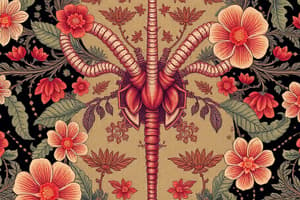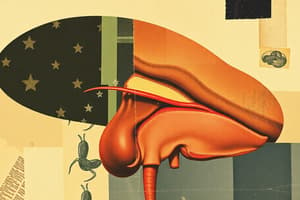Podcast
Questions and Answers
TSH, LH, and FSH share a similar structure. What specific component do they have in common?
TSH, LH, and FSH share a similar structure. What specific component do they have in common?
- α-subunit (correct)
- Glycosylation pattern
- Unique amino acid sequence
- β-subunit
If a patient has chronically elevated cortisol levels due to an adrenal tumor, which of the following hormonal changes would likely be observed?
If a patient has chronically elevated cortisol levels due to an adrenal tumor, which of the following hormonal changes would likely be observed?
- Decreased ACTH secretion (correct)
- No change in ACTH secretion
- Increased CRH secretion
- Increased ACTH secretion
A patient is diagnosed with Addison’s disease due to autoimmune destruction of the adrenal cortex. Which of the following hormonal profiles would be expected?
A patient is diagnosed with Addison’s disease due to autoimmune destruction of the adrenal cortex. Which of the following hormonal profiles would be expected?
- High cortisol, low ACTH
- High cortisol, high ACTH
- Low cortisol, high ACTH (correct)
- Low cortisol, low ACTH
Which of the following best describes the role of insulin in product regulation?
Which of the following best describes the role of insulin in product regulation?
A researcher is studying a hormone signaling pathway and observes that Hormone A stimulates the release of Hormone B, which then inhibits the release of Hormone A. What type of feedback mechanism is this?
A researcher is studying a hormone signaling pathway and observes that Hormone A stimulates the release of Hormone B, which then inhibits the release of Hormone A. What type of feedback mechanism is this?
A patient with androgen insensitivity syndrome typically presents with which of the following?
A patient with androgen insensitivity syndrome typically presents with which of the following?
A 58-year-old woman with osteoporosis has low calcium, low PTH, and normal vitamin D. Which condition is the most likely diagnosis?
A 58-year-old woman with osteoporosis has low calcium, low PTH, and normal vitamin D. Which condition is the most likely diagnosis?
A patient presents with low calcium and low PTH. If the patient's history indicates they had recent surgery to remove a certain set of glands, which is the most likely diagnosis?
A patient presents with low calcium and low PTH. If the patient's history indicates they had recent surgery to remove a certain set of glands, which is the most likely diagnosis?
A 52-year-old man with hypertension presents with fatigue, muscle weakness, frequent urination, hypokalemia, metabolic alkalosis, and low renin levels. What is the most likely diagnosis?
A 52-year-old man with hypertension presents with fatigue, muscle weakness, frequent urination, hypokalemia, metabolic alkalosis, and low renin levels. What is the most likely diagnosis?
A patient presents with hypertension, hypokalemia, and metabolic alkalosis. Which hormonal imbalance is most likely contributing to these findings?
A patient presents with hypertension, hypokalemia, and metabolic alkalosis. Which hormonal imbalance is most likely contributing to these findings?
Insulin regulation by blood glucose levels is an example of what kind of regulation?
Insulin regulation by blood glucose levels is an example of what kind of regulation?
Which anterior pituitary hormone has its secretion primarily inhibited?
Which anterior pituitary hormone has its secretion primarily inhibited?
Which hormone directly inhibits GnRH secretion as part of a negative feedback loop?
Which hormone directly inhibits GnRH secretion as part of a negative feedback loop?
A patient with a pituitary tumor causing excessive GH secretion is most likely to experience what?
A patient with a pituitary tumor causing excessive GH secretion is most likely to experience what?
How does a prolactin-secreting tumor typically affect gonadal function?
How does a prolactin-secreting tumor typically affect gonadal function?
What is the primary role of somatostatin in the context of growth hormone (GH) regulation?
What is the primary role of somatostatin in the context of growth hormone (GH) regulation?
Which of the following accurately describes the relationship between TRH and TSH?
Which of the following accurately describes the relationship between TRH and TSH?
If a patient's blood tests reveal elevated levels of cortisol, which hormone would you expect to be suppressed due to negative feedback?
If a patient's blood tests reveal elevated levels of cortisol, which hormone would you expect to be suppressed due to negative feedback?
Steroid hormones primarily affect target cells by which of the following mechanisms?
Steroid hormones primarily affect target cells by which of the following mechanisms?
Which of the following hormones is directly secreted by the pancreas in response to elevated blood glucose levels?
Which of the following hormones is directly secreted by the pancreas in response to elevated blood glucose levels?
Sex hormone-binding globulin (SHBG) primarily transports which of the following hormones in the bloodstream?
Sex hormone-binding globulin (SHBG) primarily transports which of the following hormones in the bloodstream?
What is the primary physiological effect of gastrin on the digestive system?
What is the primary physiological effect of gastrin on the digestive system?
Which of the following hormones is directly released from the anterior pituitary gland?
Which of the following hormones is directly released from the anterior pituitary gland?
Corticotropin-releasing hormone (CRH) from the hypothalamus primarily stimulates the release of which hormone from the anterior pituitary?
Corticotropin-releasing hormone (CRH) from the hypothalamus primarily stimulates the release of which hormone from the anterior pituitary?
If a patient has a tumor that constantly secretes gastrin, leading to excessive gastric acid production, which of the following symptoms is MOST likely to occur?
If a patient has a tumor that constantly secretes gastrin, leading to excessive gastric acid production, which of the following symptoms is MOST likely to occur?
A researcher is studying the effects of a novel drug on hormone transport. They observe that the drug significantly reduces the binding affinity of SHBG for testosterone. What is the MOST likely consequence of this drug's effect on testosterone activity?
A researcher is studying the effects of a novel drug on hormone transport. They observe that the drug significantly reduces the binding affinity of SHBG for testosterone. What is the MOST likely consequence of this drug's effect on testosterone activity?
How does low estrogen concentration affect Follicle Stimulating Hormone (FSH) secretion during the early follicular phase?
How does low estrogen concentration affect Follicle Stimulating Hormone (FSH) secretion during the early follicular phase?
What is the role of high estrogen concentration during the midcycle?
What is the role of high estrogen concentration during the midcycle?
Why does the corpus luteum regress when fertilization does not occur?
Why does the corpus luteum regress when fertilization does not occur?
What is the primary reason LH (Luteinizing Hormone) levels drop during the luteal phase?
What is the primary reason LH (Luteinizing Hormone) levels drop during the luteal phase?
Which of the following is a characteristic feature of the secretory phase of the uterine cycle?
Which of the following is a characteristic feature of the secretory phase of the uterine cycle?
What is the role of endometrial gland secretions during the uterine cycle?
What is the role of endometrial gland secretions during the uterine cycle?
How does the corpus luteum ensure the maintenance of the endometrium to support a potential pregnancy?
How does the corpus luteum ensure the maintenance of the endometrium to support a potential pregnancy?
What event signifies the end of the luteal phase if fertilization does not occur?
What event signifies the end of the luteal phase if fertilization does not occur?
In menopause, why do luteinizing hormone (LH) and follicle-stimulating hormone (FSH) secretion increase?
In menopause, why do luteinizing hormone (LH) and follicle-stimulating hormone (FSH) secretion increase?
How does estrogen primarily affect cholesterol levels in the cardiovascular system?
How does estrogen primarily affect cholesterol levels in the cardiovascular system?
What cardiovascular effect is associated with estrogen, despite also increasing angiotensinogen production?
What cardiovascular effect is associated with estrogen, despite also increasing angiotensinogen production?
What potential risk to the cardiovascular system is associated with estrogen?
What potential risk to the cardiovascular system is associated with estrogen?
What metabolic change occurs during pregnancy that can lead to gestational diabetes?
What metabolic change occurs during pregnancy that can lead to gestational diabetes?
How might decreased fat deposition during pregnancy affect vitamin levels?
How might decreased fat deposition during pregnancy affect vitamin levels?
What is a consequence of increased insulin resistance during pregnancy, besides potential glucose intolerance?
What is a consequence of increased insulin resistance during pregnancy, besides potential glucose intolerance?
How does pregnancy affect the distribution and balance of water-soluble vitamins when associated with decreased fat deposition?
How does pregnancy affect the distribution and balance of water-soluble vitamins when associated with decreased fat deposition?
Flashcards
Steroid Hormones Binding
Steroid Hormones Binding
Steroid hormones bind to intracellular nuclear receptors, activating gene expression.
Pancreas Hormone
Pancreas Hormone
Insulin is the hormone secreted by the pancreas, regulating blood sugar levels.
SHBG Transport
SHBG Transport
Testosterone is transported in the blood by sex hormone-binding globulin (SHBG).
Function of Gastrin
Function of Gastrin
Signup and view all the flashcards
Anterior Pituitary Hormone
Anterior Pituitary Hormone
Signup and view all the flashcards
CRH Stimulates ACTH
CRH Stimulates ACTH
Signup and view all the flashcards
Cortisol and ACTH
Cortisol and ACTH
Signup and view all the flashcards
Incorrect Hormones Sources
Incorrect Hormones Sources
Signup and view all the flashcards
TSH Structure
TSH Structure
Signup and view all the flashcards
Negative Feedback Example
Negative Feedback Example
Signup and view all the flashcards
Addison's Disease Cause
Addison's Disease Cause
Signup and view all the flashcards
Product Regulation Hormone
Product Regulation Hormone
Signup and view all the flashcards
Cushing's Syndrome Cause
Cushing's Syndrome Cause
Signup and view all the flashcards
Androgen Insensitivity Syndrome
Androgen Insensitivity Syndrome
Signup and view all the flashcards
Hypoparathyroidism
Hypoparathyroidism
Signup and view all the flashcards
Primary Hyperaldosteronism
Primary Hyperaldosteronism
Signup and view all the flashcards
Cushing’s Disease
Cushing’s Disease
Signup and view all the flashcards
Osteomalacia
Osteomalacia
Signup and view all the flashcards
Regulation of Insulin
Regulation of Insulin
Signup and view all the flashcards
Unique Hormone Inhibition
Unique Hormone Inhibition
Signup and view all the flashcards
Negative Feedback of GnRH
Negative Feedback of GnRH
Signup and view all the flashcards
Excess GH Effects
Excess GH Effects
Signup and view all the flashcards
Inhibitory Hormones
Inhibitory Hormones
Signup and view all the flashcards
Role of ACTH
Role of ACTH
Signup and view all the flashcards
GH and Glucose
GH and Glucose
Signup and view all the flashcards
Tumor and Prolactin
Tumor and Prolactin
Signup and view all the flashcards
Inhibin secretion increase
Inhibin secretion increase
Signup and view all the flashcards
Non-reproductive effect of estrogen
Non-reproductive effect of estrogen
Signup and view all the flashcards
Metabolic effect of pregnancy
Metabolic effect of pregnancy
Signup and view all the flashcards
Estrogen and blood pressure
Estrogen and blood pressure
Signup and view all the flashcards
Estrogen and coagulation
Estrogen and coagulation
Signup and view all the flashcards
Insulin resistance and diabetes
Insulin resistance and diabetes
Signup and view all the flashcards
Cardiovascular estrogen function
Cardiovascular estrogen function
Signup and view all the flashcards
Hormonal changes in menopause
Hormonal changes in menopause
Signup and view all the flashcards
Gonadotropin Regulation by Estrogen
Gonadotropin Regulation by Estrogen
Signup and view all the flashcards
Positive Feedback of Estrogen
Positive Feedback of Estrogen
Signup and view all the flashcards
Estrogen and GnRH Release
Estrogen and GnRH Release
Signup and view all the flashcards
Corpus Luteum Regression
Corpus Luteum Regression
Signup and view all the flashcards
Progesterone Feedback Impact
Progesterone Feedback Impact
Signup and view all the flashcards
Estradiol and Corpus Luteum
Estradiol and Corpus Luteum
Signup and view all the flashcards
Phases of Uterine Cycle
Phases of Uterine Cycle
Signup and view all the flashcards
Cycle Phase Characteristic
Cycle Phase Characteristic
Signup and view all the flashcards
Study Notes
PPA II SI: Exam 2 Review
- Exam 2 review for PPA II SI course
- Instructors: Chris Cavaliere and David Flynn
Module 3.1
-
Hormone Receptor Matching:
- Epinephrine: Intracellular receptors; Fast transmission
- Testosterone: Intracellular receptors; Slow transmission
- Cortisol: Intracellular receptors; Slow transmission
- Glucagon: Extracellular receptors; Fast transmission
-
Explanation of Prior Question (Hormone Receptors):
- Epinephrine acts via G-protein-coupled intracellular receptors.
- Insulin acts via enzyme-linked extracellular receptors.
- Cortisol, a steroid hormone, acts via intracellular receptors.
- Glucagon transmission is relatively slow.
-
Pituitary Hormone Secretion:
- Posterior pituitary hormones: Oxytocin, AVP
- Anterior pituitary hormones: Growth hormone (GH), ACTH, Prolactin
-
Hormone Chemistry:
- Amino acid derived hormones: Thyroid hormones (T3 and T4), calcitonin, and adrenal medulla hormones (epinephrine/norepinephrine)
- Proteins and peptides: Hypothalamus releasing hormones, many anterior pituitary hormones (ACTH, GH, Prolactin, LH, FSH), and posterior pituitary hormones (AVP, oxytocin), pancreas hormones (insulin, glucagon, somatostatin), parathyroid hormone (PTH), additional hormones from the gut/GI tract (CCK, gastrin, secretin, GLP).
- Steroid Hormones: Adrenal cortex hormones (cortisol, aldosterone, androgens), gonadal hormones (estradiol, testosterone, progesterone), vitamin D
-
Hydrophilic Hormone:
- Insulin
-
Mechanism of Steroid Hormone Action:
- Binding to nuclear receptors
-
Pancreas Hormone:
- Insulin
-
Hormone transported by SHBG:
- Testosterone
-
Function of Gastrin:
- Stimulates gastric acid secretion
-
Hormone Released from Anterior Pituitary:
- ACTH
Module 3.2
-
Hormone Stimulated by CRH:
- ACTH
-
Pituitary Hormone Structure Similarity:
- TSH shares the same alpha subunit as LH and FSH
-
Negative Feedback Example:
- High cortisol levels suppressing ACTH release
-
Condition Caused by Primary Hyposecretion:
- Addison's disease
-
Product Regulation Example:
- Insulin
-
Anterior Pituitary Hormone Inhibited Primarily:
- Prolactin
-
Hormone Inhibits GnRH:
- Testosterone
-
Effect of Pituitary Tumor secreting excess prolactin:
- Decreased GnRH release, leading to low LH/FSH and reduced gonadal function
-
Case Study (45-year-old male):
- Most likely diagnosis : Addison's disease (low cortisol, high ACTH, hyponatremia)
-
Case Study (33-year-old female):
- Most likely cause: Pituitary adenoma (Cushing's disease)
Module 3.3
-
Effect of Exogenous Anabolic Steroids:
- Decreased testicular size, reduced intratesticular testosterone (suppression of LH and FSH due to negative feedback)
-
Major Function of Leydig Cells:
- Producing androgens in response to LH
-
Site of Dysfunction (Low Testosterone, Normal LH/FSH):
- Testes
-
Metabolic Effect of Testosterone:
- Increased erythropoiesis
-
Explanation of Testosterone Therapy and Infertility:
- Suppression of LH and FSH, reducing intratesticular testosterone
Module 3.4
-
FSH Function in Early Follicular Phase:
- Promote follicle growth and estrogen production
-
Event Immediately After LH Surge:
- Ovulation
-
Role of LH in Luteal Phase:
- Stimulates the corpus luteum to produce progesterone
-
Uterine Cycle Phase (Endometrial Secretion):
- Secretory phase
-
Hormonal Change Triggering Menstruation:
- Decrease in estrogen and progesterone
-
Follicular Phase Hormone (Endometrial Proliferation):
- Estradiol
-
Hormonal Shift in Menopause (LH/FSH increase):
- Decreased negative feedback from estrogen and progesterone
-
Non-Reproductive Estrogen Effect:
- Reduces risk of blood clots (protective effect by decreasing LDL and increasing HDL)
Module 3.5
- Metabolic Effect of Pregnancy:
- Increased insulin resistance leading to potential glucose intolerance
Module 3.6
-
Organ Activating Vitamin D:
- Kidney
-
Preferred Diagnostic Tool for Osteoporosis:
- DXA (Dual-energy X-ray Absorptiometry)
-
T-Score Value for Osteoporosis Diagnosis:
- At or below -2.5
-
Risk Factor for Osteoporosis:
- Vitamin D deficiency
-
Main Cause of Osteoporosis in Postmenopausal Women:
- Estrogen deficiency
Module 3.7
-
Symptom Not Associated with Hyperthyroidism:
- Bradycardia
-
Half-Life of Free T4:
- 6-7 days
-
Treatment Not Typically Used for Hyperthyroidism:
- Levothyroxine (this is a treatment for hypothyroidism)
-
Most Sensitive Lab Test for Thyroid Disorders:
- Thyroid-stimulating hormone (TSH)
-
Enzyme for Conversion of T4 to T3:
- Deiodinase
Module 3.8
-
Function Not Performed by Insulin:
- Promoting lipolysis
-
Hormone Secreted from Pancreatic Alpha Cells:
- Glucagon
-
Primary Role of Glucagon in Metabolism:
- Increasing glucose production
-
Enzyme Glucagon Activates in Fat Tissue:
- Hormone-sensitive lipase
-
Mechanism Affecting Glucose Metabolism by Epinephrine:
- Stimulates glycogen breakdown (glycogenolysis)
-
Key Symptom of Cushing's Syndrome:
- Protein wasting
Module 3.9
-
Hormone Stimulating IGF-1 Production:
- Growth Hormone
-
Hormone Primarily Affecting Liver and Fat Tissue (Minimal Skeletal Muscle Effect):
- Glucagon
Studying That Suits You
Use AI to generate personalized quizzes and flashcards to suit your learning preferences.




